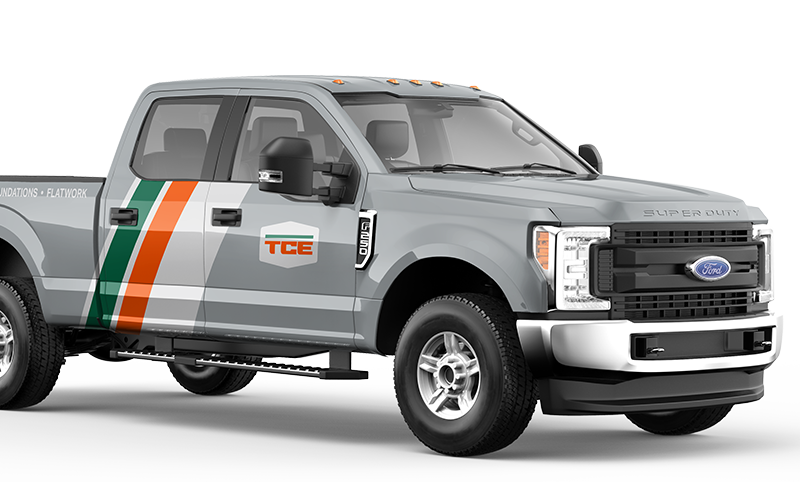7 Decisions to Make Before Marketing Your Construction Company

No one knows your construction company better than you. But as a contractor, creating a construction marketing plan may not come easy.
Whether your construction firm is a large, medium, or small business–a big challenge in the construction industry is well-established competition. Relying on word-of-mouth to win construction jobs is not enough in today's competitive environment.
Building your brand on a strong foundation is pivotal for construction marketing success. Before you start marketing your construction business, examine your industry and target market. Then it’s time for some good old-fashioned decision-making.
1. Define Your Brand
Potential customers may assume that commercial construction firms are all the same. Yet, that doesn't mean there's nothing "distinctive" to make one stand apart from the rest.
Your brand is what people need to know, understand, and believe before they will do business with you.
Defining your brand starts with creating your brand vision. Once you've written your vision statement, then you can work on your brand positioning. These branding exercises help you communicate your unique value so people can decide if you are right for them.
|
CONSTRUCTION-DRIVEN ENGINEERING
Kiewit engineers are focused on what matters most to you: performance, schedule, safety, total installed, and operating costs. |
|
PEOPLE, INTEGRITY, EXCELLENCE, STEWARDSHIP
These core values have been the foundation of everything we do since our company was founded. It’s who we are as a company—and what drives us to be the best, most ethical contractor on every job we perform. |
|
EXPERIENCE MATTERS
Kiewit brings more than 130 years of experience, stability and innovation to every project. |
Kiewit is providing a clear definition of how they want people to think about them.
“Kiewit is a construction-driven engineering company that brings extensive experience to every project. They value people, integrity, excellence, and stewardship above everything else.”
2. Identify Your Construction Niche and Ideal Clients
To understand the importance of what you offer, you also have to know who your potential clients are. The most successful builders know they are solving a problem for a certain set of people with specific needs. Trying to market to everyone can mean you miss the mark. Creating detailed buyer personas , in theory, puts a human idea in front of you to base marketing efforts on.
Answer the following questions:
- What areas of construction make you excited to go to work in the morning?
- What are you best at?
- Out of your existing customers, who are the most profitable?
- Is there an industry that you have a lot of experience working for?
- Are you a general contractor or do you work primarily for a specific industry?
- What types of customers are looking for long-term partners?
You can build a formidable construction business with the right target audiences. Find the right mix of people that value your work, bring profitable projects to the table, and are looking for long-term partnerships.
When you know who you want to attract, it helps you clarify branding decisions. It's easier to decide what your logo and web design should look like and how you speak to people on social media.
3. Pinpoint Why People Should Care
You've decided what is different about your construction company, but why would clients care? You may have the latest equipment and the most qualified workers but that only helps your potential customers if it fixes their problems.
There are many construction marketing ideas that can stem from addressing buyer motivations.
Consider this:
Purchasing processes are crucial for achieving a competitive edge in the construction industry. Common problems include shipping delays, poor customer service, and incorrect product orders.
If you have long relationships with suppliers and a proven track record of supply chain management–you have something worth talking about. Potential customers will care because working with you is more profitable.
Other marketing ideas people care about are your safety record and ability to complete projects on schedule.
4. Determine How to Present Your Construction Company to the Public
Presenting your construction company to the public involves several points of action. A general guide would go something like follows:
Decide what first impression you want prospects to have.
Do you want customers to see you as innovative, friendly, or professional? Pin down the reaction you believe will matter most and work with those ideas. Keep it authentic.
Decide how to deliver your differences in a way that interests your audience.
Do your customers make buying decisions based on reading technical details or seeing past projects? Do they care most about energy-efficiency or lowering operating costs, for example? Keep it relevant.
Decide what advertising venues are the most logical for the target audience.
Are clients likely to subscribe to Professional Builder or AEC Business? What trade shows do they attend? Or, do they gather information from social media marketing sites like LinkedIn? Keep it focused.
Picking out imagery details for your logo or on branded vehicles is also part of this process. You don't have to go for anything concrete yet. But it's helpful if you can start pulling together a few general ideas. Taking notes from some do's and don'ts of the top construction company logos is helpful here.
5. Establish What Actions Will Prove You Are Different to Prospects
You have your differentiators in mind, but follow-through is the proof in the pudding. Have a plan to back up statements before releasing the first advertisement.
Schumacher Homes states:
“… you won’t find another builder who can provide all these included features and offer this much square footage for the price…”
Not only do they say it but their web design provides detailed information on how they back it up. Scroll in the window below to see the screenshot.

Pick apart every differentiator to make sure your company can back up what you claim. If not, you can lose any trust you've garnered with prospects and cause an adverse reaction among your client base.
6. Decide How to Communicate Your Differences
By now, you know how you differ from others, what you offer, and why that's important to ideal clients. It's also good to have a game plan for setting those ideas in motion.
There are a lot of construction marketing ideas you can include in your marketing plan. The list includes branding, digital marketing, social media, search engine marketing, pay-per-click, traditional advertising, blog posts, press releases, direct sales, and trade shows just to name a few.
Your construction marketing program should become part of your daily routine. You don’t have to do it overnight. For management, start with two or three ideas that make sense for you. Add to them as you grow and want to expand your reach.
If you are just starting out or are ready to take your company to the next level, consider getting a professional logo, business cards, and web design. The next step would be to get vehicle graphics and job signs.
7. Set Your Marketing Budget and Commit to It
Construction marketing is an investment, not an expense. If your goal is to be a leader in your market, then you will need to budget more than the guy who just wants to get by.
“A budget is telling your money where to go instead of wondering where it went.”
—Dave Ramsey
According to the 2019 CMO Survey , Mining and Construction industries invest 5-7% of their company revenue in marketing. This means that if your company does $5 million in revenue, then $250,000/year is a conservative investment.
Yearly marketing budgets include all marketing, sales, and business development expenses, such as:
- Salaries and related expenses (company cars, travel, etc.)
- Proposal development and submitting bids
- Marketing agency services
- Public relations firm services
- Industry specific events (trade shows, networking opportunities, golf tournaments, etc.)
- Customer and employee appreciation events (meals, entertainment, lunch and learns, etc.)
- Branding development (logo design, company clothing, vehicle graphics, job signage, etc.)
- Graphics design and printing for business cards, brochures, and other handouts
- Trade show event displays
- Promotional merchandise and gifts to customers
- Website design and maintenance
- Creating content (blog articles, case studies, etc.)
- Social media management
- Search engine optimization (SEO) services
- Google Ads and other paid search advertising
- Marketing software (CRM, email automation, etc.)
- Membership dues for trade associations
- Sponsorships
The biggest chunk of your investment must be online, about 50%. This number includes digital marketing, online business development, web design, and website maintenance. It also includes photography, video content, renderings, site maps, copywriting, etc.
Every construction business is different and so are marketing needs. If you’re trying to expand into a new market–or your competition has gotten tougher–then you might need a more aggressive budget. It's important for you to discover what works for you.
Takeaways to Remember
- Defining your brand is key, everything is built around that
- Identity the problems you solve best and who you want to solve them for
- Address buyer motivations
- Start working on how you'll present your company to the public
- Create clear plans of action that prove your differences
- Plan how to set your ideas in motion
- Decide how much to invest each month and stick with it for a year
Give Your Construction Marketing Strategy Direction
Prior planning is vital to a well-designed marketing strategy for construction companies. It's okay if you don't have all the answers. Working with a full-service marketing agency gives you specialized help with marketing strategies. Reach out to Diggles Creative for a free marketing consultation to find out how we can help you get to sustainable growth.


